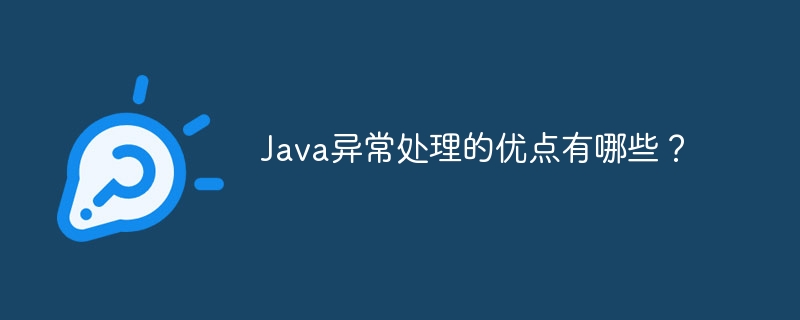What are the advantages of Java exception handling?
The advantages of Java exception handling include: improving code robustness, preventing crashes, enhancing code clarity, separating error handling logic, classifying and handling errors of different severities or types through the exception hierarchy, customizing exception handling, and flexibly responding to specific error conditions

Advantages of Java Exception Handling
Exception handling is a mechanism for handling errors or exceptions that may occur in an application. It provides the following main advantages:
1. Improved code robustness
Exception handling allows the program to detect and handle errors, thus preventing the application from crashing when unexpected conditions occur . This improves the robustness of your code and ensures that your program continues to function properly when problems arise.
2. Code clarity
Exception handling can improve code readability and maintainability by separating error handling logic from normal business logic. It allows developers to focus on writing core application logic while delegating exception handling to specialized blocks of code.
3. Exception Hierarchy
Java provides an exception hierarchy, in which different exception classes represent different types of errors. This allows developers to handle exceptions based on the severity or type of error.
4. Custom Exception Handling
Java allows developers to create custom exception classes to handle application-specific errors. This provides a mechanism to control how an application responds to specific error conditions.
Practical Case
To demonstrate the advantages of exception handling, let us consider the following code block:
try {
// 潜在错误区域
} catch (Exception e) {
// 异常处理逻辑
}In this code block, The try block contains code that may throw an exception. If an exception occurs, it will be caught and handled by the catch block. This ensures that the application does not crash when an error occurs and that appropriate exception handling actions can be performed, such as logging an error message or notifying the user.
By using exception handling, we can ensure that the application runs in a graceful manner even when errors occur, thus improving overall robustness and user experience.
The above is the detailed content of What are the advantages of Java exception handling?. For more information, please follow other related articles on the PHP Chinese website!

Hot AI Tools

Undresser.AI Undress
AI-powered app for creating realistic nude photos

AI Clothes Remover
Online AI tool for removing clothes from photos.

Undress AI Tool
Undress images for free

Clothoff.io
AI clothes remover

AI Hentai Generator
Generate AI Hentai for free.

Hot Article

Hot Tools

Notepad++7.3.1
Easy-to-use and free code editor

SublimeText3 Chinese version
Chinese version, very easy to use

Zend Studio 13.0.1
Powerful PHP integrated development environment

Dreamweaver CS6
Visual web development tools

SublimeText3 Mac version
God-level code editing software (SublimeText3)

Hot Topics
 Square Root in Java
Aug 30, 2024 pm 04:26 PM
Square Root in Java
Aug 30, 2024 pm 04:26 PM
Guide to Square Root in Java. Here we discuss how Square Root works in Java with example and its code implementation respectively.
 Perfect Number in Java
Aug 30, 2024 pm 04:28 PM
Perfect Number in Java
Aug 30, 2024 pm 04:28 PM
Guide to Perfect Number in Java. Here we discuss the Definition, How to check Perfect number in Java?, examples with code implementation.
 Random Number Generator in Java
Aug 30, 2024 pm 04:27 PM
Random Number Generator in Java
Aug 30, 2024 pm 04:27 PM
Guide to Random Number Generator in Java. Here we discuss Functions in Java with examples and two different Generators with ther examples.
 Armstrong Number in Java
Aug 30, 2024 pm 04:26 PM
Armstrong Number in Java
Aug 30, 2024 pm 04:26 PM
Guide to the Armstrong Number in Java. Here we discuss an introduction to Armstrong's number in java along with some of the code.
 Weka in Java
Aug 30, 2024 pm 04:28 PM
Weka in Java
Aug 30, 2024 pm 04:28 PM
Guide to Weka in Java. Here we discuss the Introduction, how to use weka java, the type of platform, and advantages with examples.
 Smith Number in Java
Aug 30, 2024 pm 04:28 PM
Smith Number in Java
Aug 30, 2024 pm 04:28 PM
Guide to Smith Number in Java. Here we discuss the Definition, How to check smith number in Java? example with code implementation.
 Java Spring Interview Questions
Aug 30, 2024 pm 04:29 PM
Java Spring Interview Questions
Aug 30, 2024 pm 04:29 PM
In this article, we have kept the most asked Java Spring Interview Questions with their detailed answers. So that you can crack the interview.
 Break or return from Java 8 stream forEach?
Feb 07, 2025 pm 12:09 PM
Break or return from Java 8 stream forEach?
Feb 07, 2025 pm 12:09 PM
Java 8 introduces the Stream API, providing a powerful and expressive way to process data collections. However, a common question when using Stream is: How to break or return from a forEach operation? Traditional loops allow for early interruption or return, but Stream's forEach method does not directly support this method. This article will explain the reasons and explore alternative methods for implementing premature termination in Stream processing systems. Further reading: Java Stream API improvements Understand Stream forEach The forEach method is a terminal operation that performs one operation on each element in the Stream. Its design intention is






